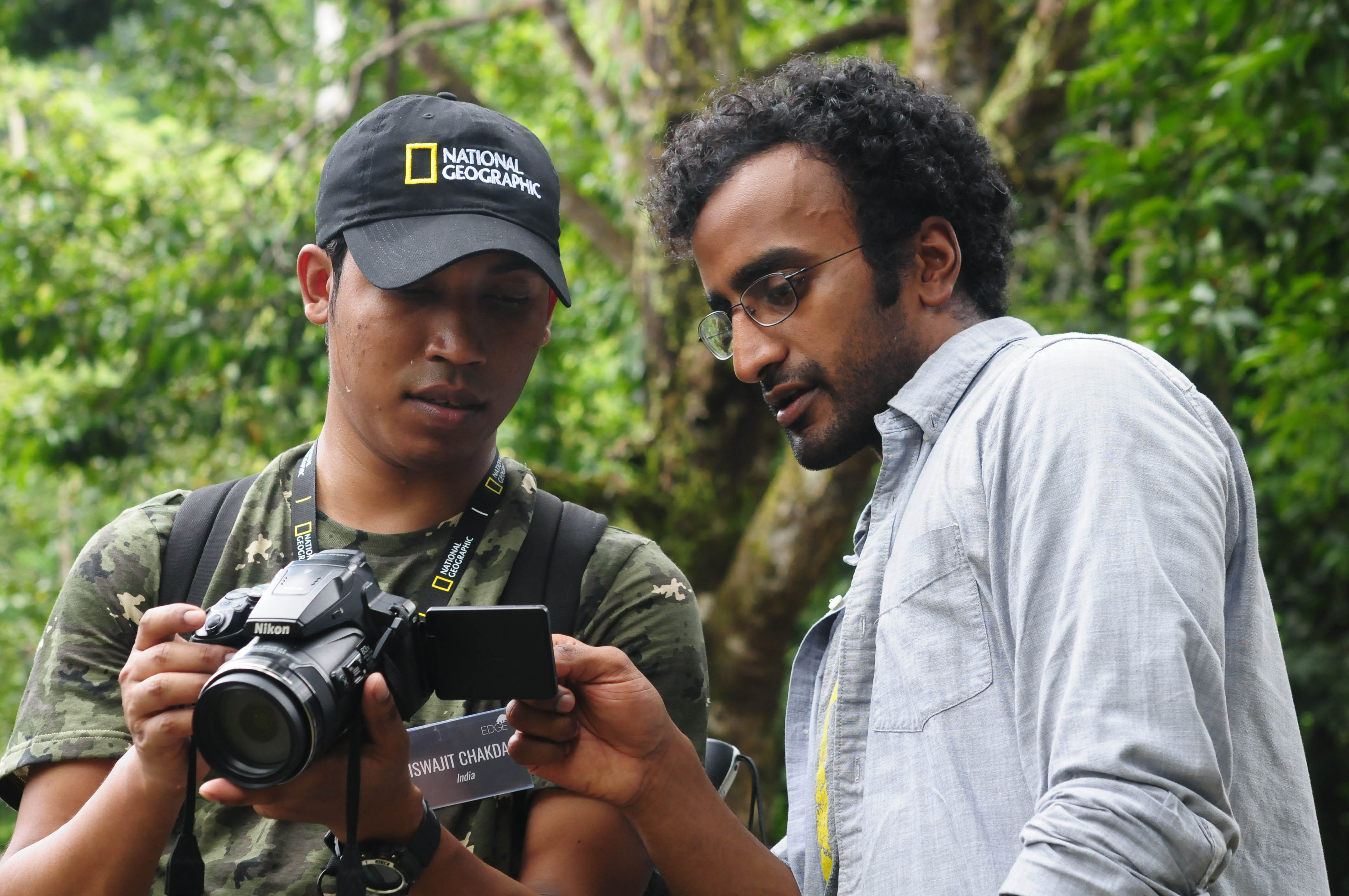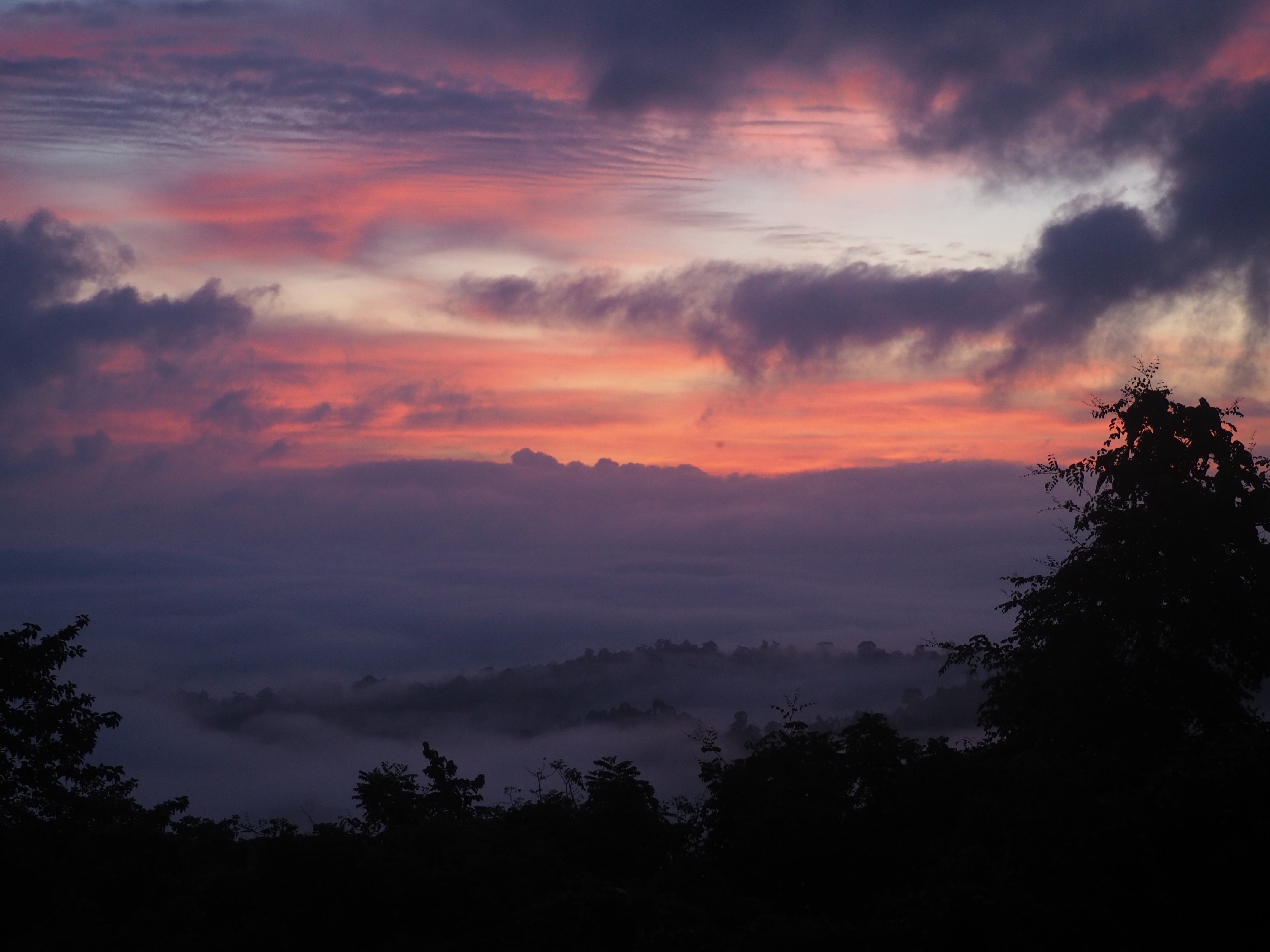Here at EDGE of Existence we often talk about the Fellow’s experience on the Conservation Tools course; what they learnt, what they enjoyed and what skills they hope to use in the future. Rarely however do we ask the staff about the experience. So, I asked the EDGE team to answer one question – What was it really like delivering a course in the middle of the Bornean rainforest for a month?
The Course
Every day started early – wake up at 6.30am followed by breakfast at 7am. For the keen ones, like Fran Cabada our resident marine biologist, there was even time for some exercise – with a twist:
“I regularly ran every morning that I could, I was the only lucky one to see a male orangutan, actually on the ground crossing a trail in front of me!”
Once fed and watered, regardless of levels of exercise already achieved, it was time to tackle the first lectures of the day at 8.00am sharp. Between lectures there would be opportunities to have coffee breaks on the veranda admiring the surrounding lush Bornean rainforest. After lunch the afternoon teaching session would start, quickly followed by dinner. Training didn’t stop after dinner, with Fellows often doing presentations or staff leading lectures or excursions into the rainforest to learn field skills.
Lectures covered a range of topics taught by the different staff members including data analysis and statistical techniques, financial management, social research dimensions and much more. As with all lectures, things can get a bit monotonous, so the EDGE team had various ways to keep both themselves and the Fellows entertained. Fran had an interesting technique:
“I myself will forever be remembered by my creepy human analogies to exemplify something. This is actually a great teaching tool. When the examples are shocking, they are fixed in the long-term memory.”
Cass Murray, our Social Dimensions Specialist, had slightly different ideas:
“I took it upon myself to keep morale up through the medium of dance! Whenever Fellows or staff felt tired or overwhelmed with the content (e.g. Stats!), I was called up to the front of the class to lead a group dance. Usually animal or culturally themed, I had the group ‘swinging’ round the classroom calling like gibbons or sidestepping like crazy crabs. As you can imagine this resulted in lots of laughter, but it also gave us all the much-needed energy boost to get through the next session.”
The Fellows were also lucky enough to have a National Geographic Sciencetelling Bootcamp where they learned from world-class National Geographic photographer Anand Varma as well as National Geographic editors and digital video producers. These expert storytellers taught them how to showcase their work through captivating photos, compelling video and stories written from the field.

Rainforest Life
Living in the rainforest for one month can only be described as amazing. A core theme from the EDGE team was how brilliant it was to wake up to the sound of gibbons singing – the cockerels of the rainforest one could say. Cass summed up the experience beautifully:
“[Living in the rainforest for a month was] like living in a beautiful bubble, with the occasional leech. What always get me are the sounds; the heavy rain on a tin roof, the morning song of the gibbons, the multiple high-pitched sounds of the cicada and the unmistakable honk of the hornbills. You always think that it will be quiet compared to cities but it’s the complete opposite, it’s full of life and amazing sounds!”
Living in the rainforest has its perks, mainly in the form of incredible animal sightings. From monitor lizards to baby orangutans – the team saw it all. They were even able to spot a rare EDGE species, the Helmeted Hornbill! Jyoti Das, Regional Projects Manager for Asia, saw many animals for the first time in the wild including bearded pigs, orangutans, Hornbills, red-leaf monkeys and many others. Charlie Debenham our EDGE Fellowship Coordinator had a memorable experience watching a female orangutan and her baby: “I was so excited that I didn’t realise that I had leeches all over my legs where I had been running in the grass!” Davi Teles our Regional Projects Manager for Latin America saw a binturong four mornings in a row but when he took the rest of the team to see, it was nowhere in sight!
One of the downsides of living in the rainforest is that you’re in the middle of nowhere so you don’t get that much choice when it comes to food. When asked what they ate, the team had different things to say:
“A lot of chicken wings, I don’t think the meat eaters ever wanted to see a chicken wing ever again after a month! But we also ate lots of rice, noodles and vegetables.”– Cass
“Rice, a lot of rice”– Fran
All work and no play makes Jack a dull boy
Despite the intense days of lectures, field work sessions and presentations, both the Fellows and EDGE team had a chance to relax on their few days off. On the first rest day they ventured to the Rhino Pool, where they could swim in the river – a real privilege to swim in such beautiful surrounding with lush rainforest on both sides! As a way of introducing the Fellows to British culture, the staff hosted them for their first “pub quiz” including food and treats for the winners. There were also various sporting activities like a very competitive football match with about 50 players on the pitch including Danum research assistants, their families, Fellows, EDGE staff and one very enthusiastic Brazilian (Davi!). On their last day off everyone headed up to the watchtower first thing in the morning to watch the sunrise, a truly magical experience.

The Highlights
Everyone came back filled with stories and highlights of both the Fellows and the wildlife. Whether it was seeing a male orangutan cross your path like Fran, interviewing the Fellows about how much they enjoyed the course and will cherish the memories forever like Charlie or watching the Fellow’s thank you video and performance at the end of the course like Cass, it was a truly emotional, rewarding, unique and wonderful experience for the staff – in their own words!
Find out more about the 2019 Conservation Tools course here.